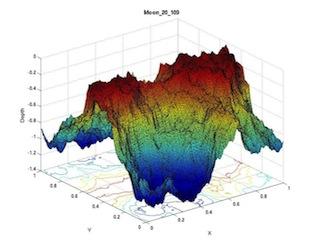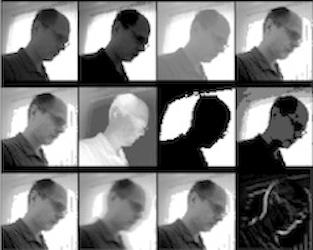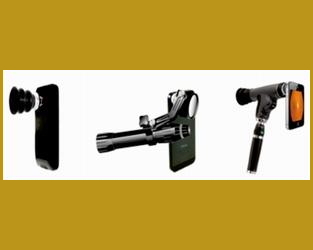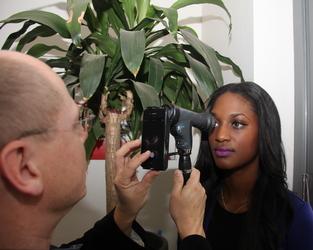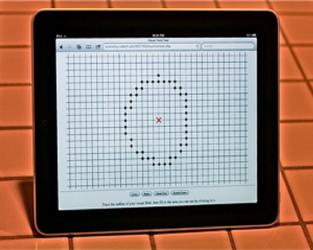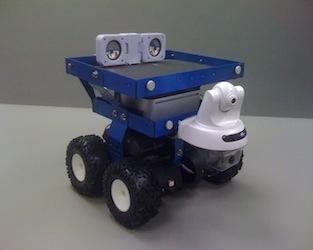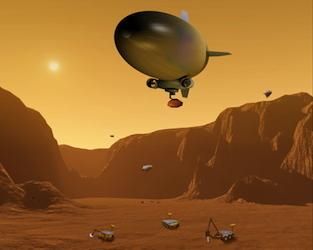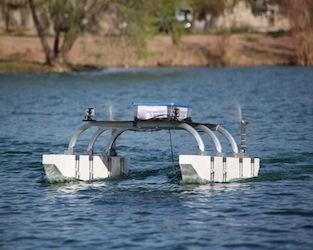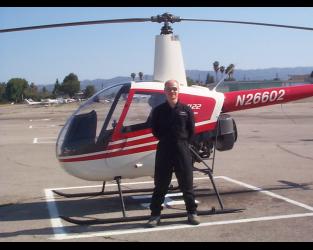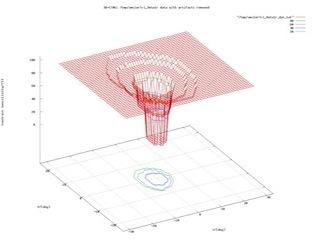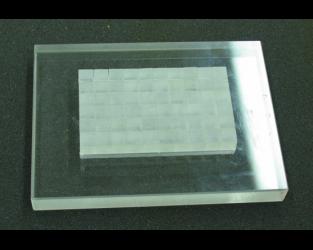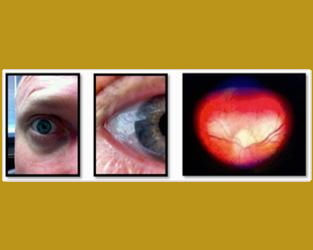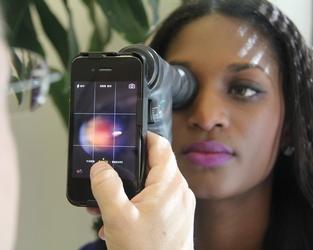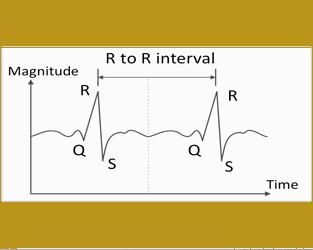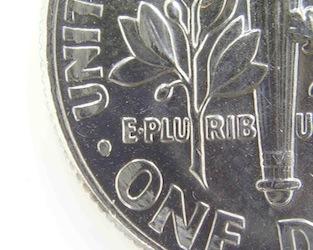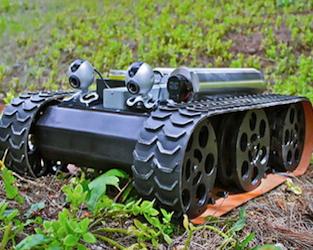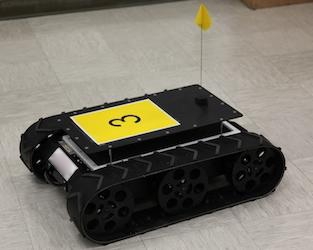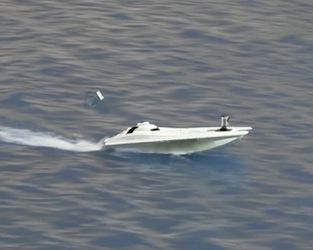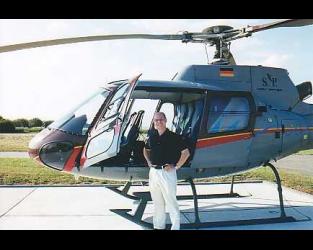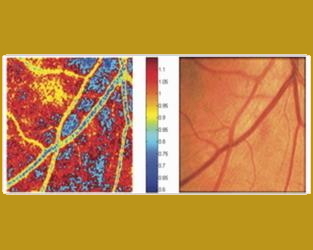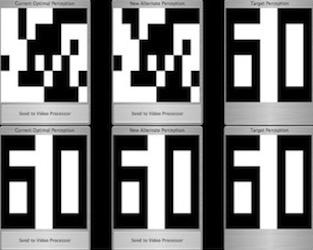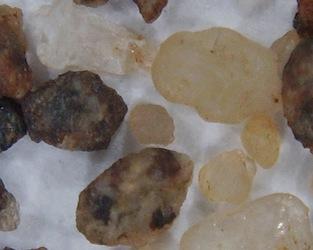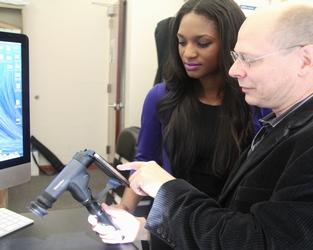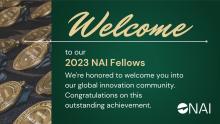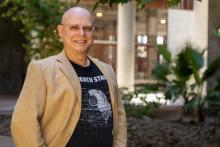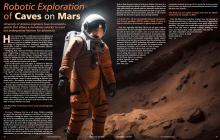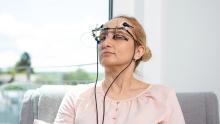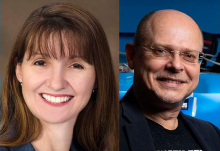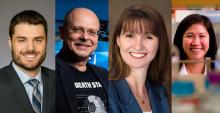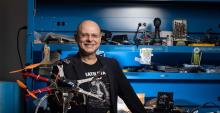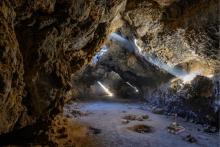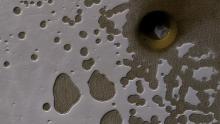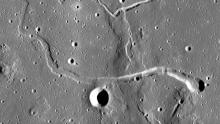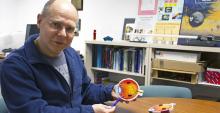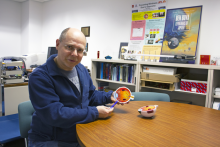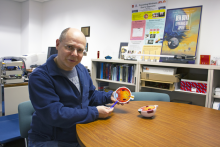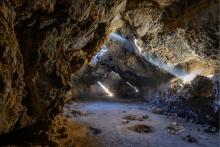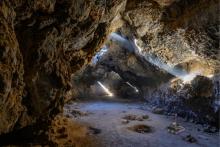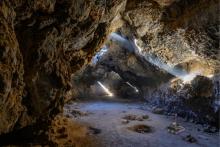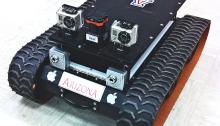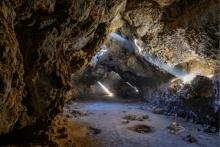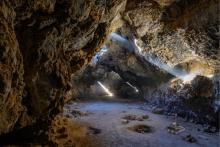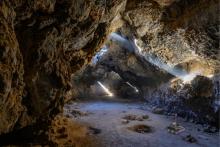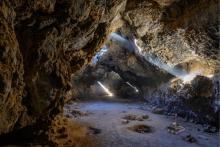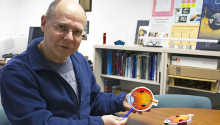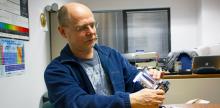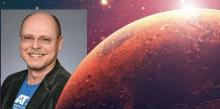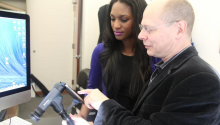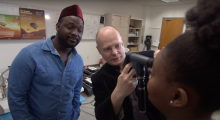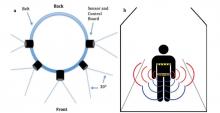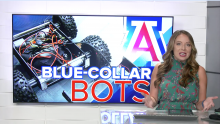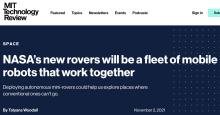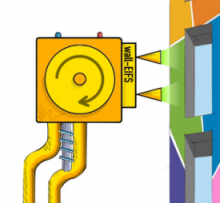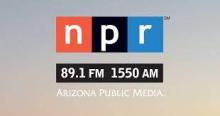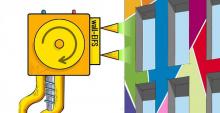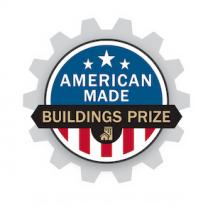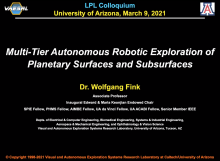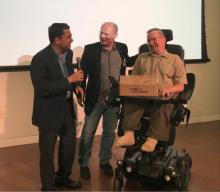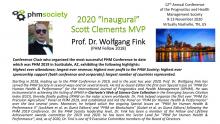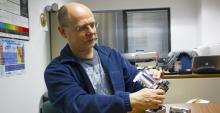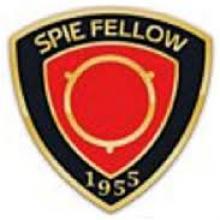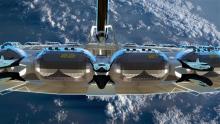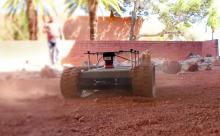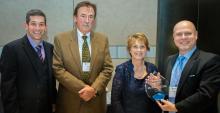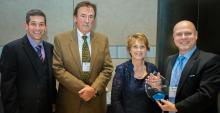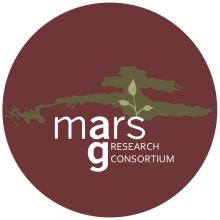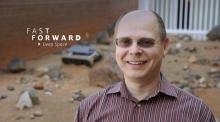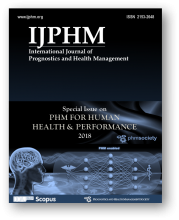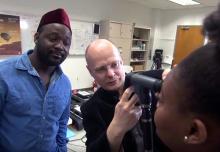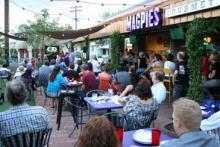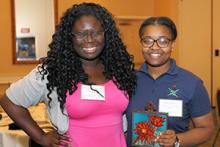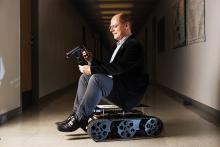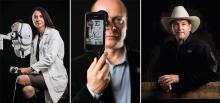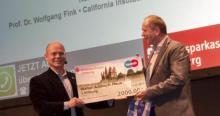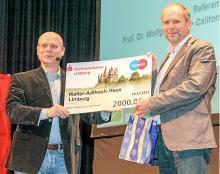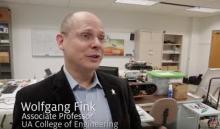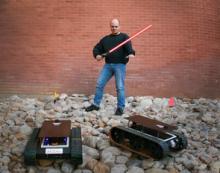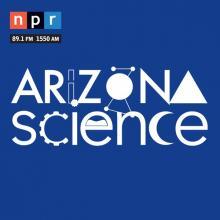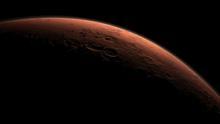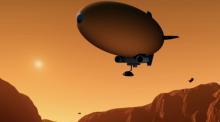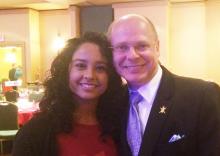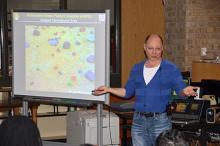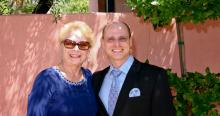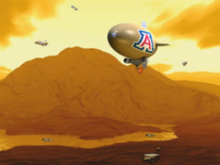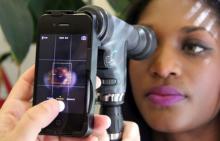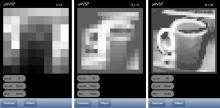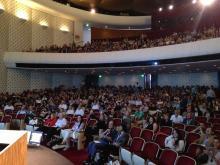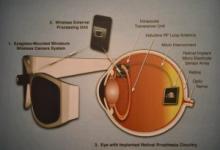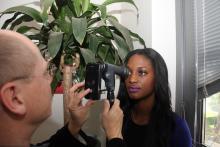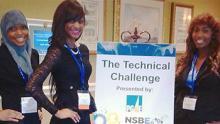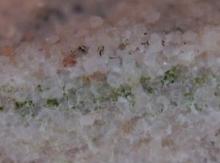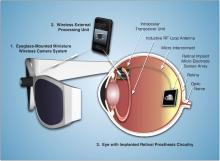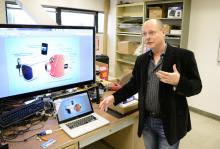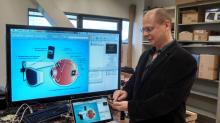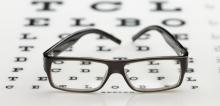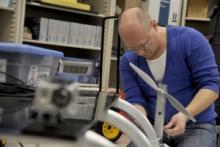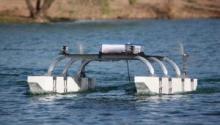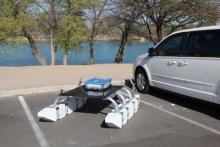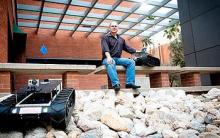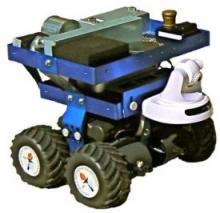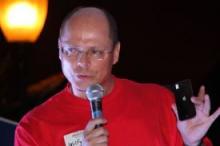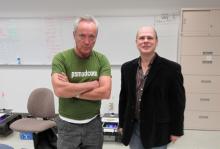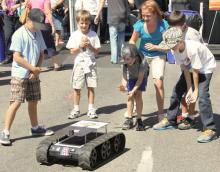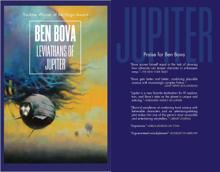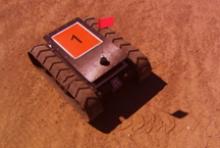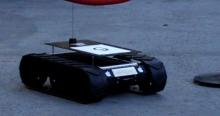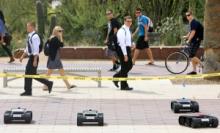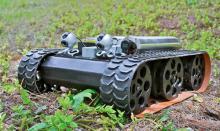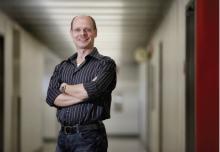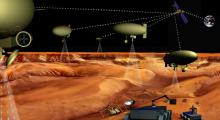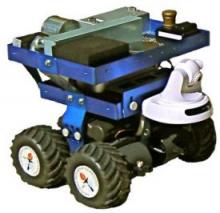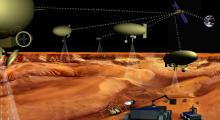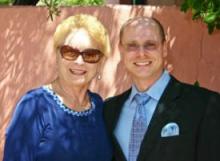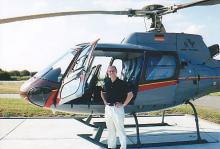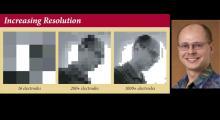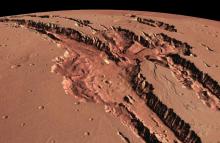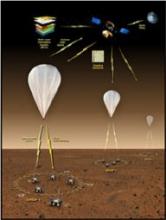Prof. Wolfgang Fink received a Special Congressional Recognition from the United States House of Representatives by the Honorable Congressman Juan Ciscomani in honor of his election by the National Academy of Inventors (NAI) to the Class of Fellows 2023.
News
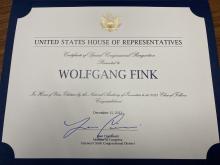
Prof. Wolfgang Fink has been elevated to Fellow of the National Academy of Inventors (NAI), Class of 2023, for having “demonstrated a highly prolific spirit of innovation in creating or facilitating outstanding inventions that have made a tangible impact on the quality of life, economic development, and welfare of society.” NAI Fellow status is nationally recognized as the highest professional distinction awarded to academic inventors. [NAI]
The National Academy of Inventors has elected two University of Arizona faculty members to its 2023 Class of Fellows. Wolfgang Fink, professor of electrical & computer engineering and biomedical engineering, and Douglas Loy, professor of materials science & engineering, each received the designation this week. NAI fellow status is the highest professional distinction awarded by the organization. [Photo Credit: Molly Condit, Great Bear Media]
Prof. Wolfgang Fink interviewed by Matt Zbrog for Online Engineering Programs on the hottest problems in Electrical Engineering. Electrical engineering is a rich field with challenges for tomorrow’s engineers. Sitting at one of the most interesting crossroads of science and technology, its territory stretches across microelectronics, energy systems, telecommunications, and robotics.
Prof. Dr. Wolfgang Fink featured in the Digital Edition of Tech Briefs July 2023 (formerly NASA Tech Briefs) on the "Hansel & Gretel Breadcrumb"-inspired, patent-pending Dynamically Deployed Communication Network (DDCN) paradigm, using mesh topology, for planetary subsurface exploration as well as the scouting out of underground habitats for astronauts.
Podcast-interviewed by Arizona Science on AZPM/NPR: The University of Arizona is a leader in bio-engineered optical science. Prof. Wolfgang Fink directs research into visual prosthetic technology at UA. He describes how electrical stimulation of the optic nerve can advance the visual experience for the blind. Prof. Wolfgang Fink spoke with Leslie Tolbert, Ph.D., Regents Professor emerita in Neuroscience at the University of Arizona.
Prof. Fink earned the inaugural University Faculty Service Award - one of the highest honors at the University of Arizona. Created in 2022, the award recognizes faculty members who have demonstrated significant leadership and impact in service activities, such as community engagement, academic societies and university committees. Prof.
Prof. Wolfgang Fink earned the inaugural University Faculty Service Award. Created in 2022, the award recognizes faculty members who have demonstrated significant leadership and impact in service activities, such as community engagement, academic societies and university committees. Fink was selected for his “astonishing commitment to STEM education.” This award is one of the highest honors at the University of Arizona.
Prof. Dr. Wolfgang Fink featured by The University of Arizona Foundation: The Edward & Maria Keonjian Endowed Chair Supports Discoveries Big and Small. The beauty of philanthropic funding is that it supports the pursuit of truly novel ideas that are beyond the purview of funding agencies, and it offers opportunities that you can’t typically access with grant or federal funding, like the opportunity to attend a conference in a new field of interest.
Podcast-interviewed by Tech Briefs: University of Arizona engineers have developed a new system that allows autonomous vehicles to scout out underground habitats for astronauts. On this episode of Here's an Idea™, Wolfgang Fink, Associate Professor of Electrical and Computer engineering at UArizona, discusses how the approach could help address one of NASA's Space Technology Grand Challenges by helping overcome the limited ability of current technology to safely traverse environments on comets, asteroids, moons, and planetary bodies such as Mars.
Featured on Mashable: Ever since scientists have had an orbiter's view of Mars, they've observed intriguing black spots on the surface so dark no one knows what's inside them. They're thought to be the mouths of deep caves where the sun doesn't shine(opens in a new tab), formed by ancient volcano vents. Within them could be existing Martian life, liquid water, or traces of long-dead bacteria or fungi that flourished eons ago.
Featured on INVERSE: Planetary exploration, specifically within our own Solar System, has provided a lifetime of scientific knowledge about the many worlds beyond Earth. However, this exploration, thus far, has primarily been limited to orbiters and landers/rovers designed for surface exploration of the celestial bodies they visit. But what if we could explore subsurface environments just as quickly as we’ve been able to explore the surface, and could some of these subsurface dwellings not only shelter future astronauts but host life, as well?
Featured in University of Arizona College of Engineering News Release: Prof. Wolfgang Fink’s selection as this year’s recipient of the SPIE Aden and Marjorie Meinel Technology Achievement Award continues a distinguished legacy of optics and photonics at the University of Arizona. He received the award for his pioneering work on ophthalmic technologies, including visual prostheses and diagnostic methods.
Featured on EurekAlert (AAAS): Prof. Wolfgang Fink’s selection as this year’s recipient of the SPIE Aden and Marjorie Meinel Technology Achievement Award continues a distinguished legacy of optics and photonics at the University of Arizona.
Featured on Bioengineer.org: Prof. Wolfgang Fink’s selection as this year’s recipient of the SPIE Aden and Marjorie Meinel Technology Achievement Award continues a distinguished legacy of optics and photonics at the University of Arizona.
Featured on ScienceNews: In the classic fairy tale, Hansel and Gretel dropped bread crumbs while walking through a treacherous forest so they wouldn’t lose their way. Rovers may one day use a similar trick to traverse other planets without losing their data.
Featured on UNIVERSE TODAY: “Lava tubes and caves would make perfect habitats for astronauts because you don’t have to build a structure; you are shielded from harmful cosmic radiation, so all you need to do is make it pretty and cozy,” said Dr. Wolfgang Fink, who is an associate professor of electrical and computer engineering at UArizona, and lead author of the study.
Featured on EarthSky: Future astronauts on Mars might use caves or lava tubes as habitats. They could provide shelter from the harsh conditions on the surface, the intense radiation in particular. On March 1, 2023, researchers at the University of Arizona said they’ve developed a new technology where small autonomous robot rovers could start exploring caves on Mars. The rovers – inspired by the fairy tale Hansel and Gretel – would drop high-tech “breadcrumbs” to find their way.
Featured on FUTURITY: Researchers have developed technology that would allow a flock of robots to explore subsurface environments on other worlds. “Lava tubes and caves would make perfect habitats for astronauts because you don’t have to build a structure; you are shielded from harmful cosmic radiation, so all you need to do is make it pretty and cozy,” says Wolfgang Fink, an associate professor of electrical and computer engineering at the University of Arizona.
Featured on The Register: University of Arizona electrical and computer engineering professor Wolfgang Fink and his team took inspiration from the fairy tale pair to develop a rover-and-breadcrumbs system they said will allow exploration deep underground, and in a manner more adaptable than previous concepts. The key to such robotic exploration is communication, and the team have a cunning plan.
Featured on GIZMODO: Tiny fleets of robots could map unexplored Martian lava tubes by periodically dropping breadcrumb-like sensors onto cave floors. Researchers from the University of Arizona have developed a possible new way of scouting for real estate on other planets: tiny robots that drop digital breadcrumbs while exploring Martian caves. It’s a method ripped straight from folklore.
Featured on NEW ATLAS: Exploring the depths of an unmapped cave system is a daunting enough prospect on its own, but think how risky it would be to do so on another planet such as Mars. That's why a new system is in the works, which would use "breadcrumb"-dropping rovers to do the job.
Featured on UA News: University of Arizona engineers have developed a system that allows autonomous vehicles to scout out underground habitats for astronauts. Prof. Fink is lead author of an article in Advances in Space Research that details a communication network that would link rovers, lake landers and even submersible vehicles through a so-called mesh topology network, allowing the machines to work together as a team, independently from human input.
Prof. Dr. Wolfgang Fink featured in University of Arizona Biomedical Engineering Department News Release: "Fink Wins 2023 SPIE Technology Achievement Award."
Prof. Dr. Wolfgang Fink has been recognized with the 2023 SPIE Aden and Marjorie Meinel Technology Achievement Award "for pioneering, sustained contributions to the development of transformational opto-medical examination and device technologies, with particular focus on visual prostheses for the blind, ophthalmology, and tele-ophthalmology." The SPIE Aden and Marjorie Meinel Technology Achievement Award recognizes outstanding technical accomplishment in optics, electro-optics, photonic engineering, or imaging.
Prof. Dr. Wolfgang Fink has been featured in the Lifestyle Magazine LiMa360 in the article: "24 Stunden sind kein Tag (24 Hours are no Day)".
The Association for Research in Vision and Ophthalmology, or ARVO, the largest eye and vision research organization in the world, has selected ECE Associate Professor and inaugural Edward & Maria Keonjian Endowed Chair Wolfgang Fink as a member of its 2023 class of Fellows. He will be honored with Silver Fellow status at the organization’s annual conference in April 2023.
Prof. Wolfgang Fink has been elevated to ARVO Silver Fellow (Class of 2023) by the Association for Research in Vision and Ophthalmology (ARVO) after more than 27 years of service to the ophthalmic & vision science community.
Prof. Wolfgang Fink with a group of neuroscience and engineering students and a blind colleague prototyped a device to help visually impaired people move through the world more safely and efficiently: VISTA - Visual Impairment Subtle Touch Aid.
Prof. Wolfgang Fink is a finalist in the U.S. Department of Energy's "Envelope Retrofit Opportunities for Building Optimization Technologies Prize," or E-ROBOT Prize. Prof. Fink co-created wall-EIFS, a robotic concept that can retrofit buildings by installing insulation, thus cutting down carbon emissions.
The MIT Technology Review article: "NASA’s new rovers will be a fleet of mobile robots that work together," showcases yet another adoption of the "Tier-Scalable Reconnaissance Paradigm" devised by Prof. Dr. Wolfgang Fink and his team 20 years ago [see foundational publication].
A team of University researchers is one of 10 Phase 1 prize winners in DOE's Envelope Retrofit Opportunities for Building Optimization Technologies - or E-ROBOT - competition. The team, comprising Prof. Wolfgang Fink, Prof. Jonathan Bean and Dewey Benson of Energy Quest Technologies, Inc., developed wall-EIFS, a robotically applied, 3D-sprayable exterior insulation and finish system for building envelope retrofits.
Prof. Dr. Wolfgang featured on NPR/Arizona Public Media regarding co-winning the $200,000 DOE/NREL E-ROBOT Prize for developing a new way to apply insulation on historic buildings using robotic technology. The end goal is to put wall-scaling machines to work installing exterior insulation on buildings.
Prof. Dr. Wolfgang Fink featured in University of Arizona College of Engineering News Release: "UArizona Team Led by Architecture Professor Jonathan Bean and Engineering Professor Wolfgang Fink Wins $200,000 ‘American-Made Challenge’ E-ROBOT Prize" to devise building envelope retrofit solutions that make retrofits easier, faster, safer and more accessible for workers.
Prof. Dr. Wolfgang Fink co-wins the $200,000 DOE/NREL-sponsored E-ROBOT Prize, an American-Made Challenge, to devise building envelope retrofit solutions that make retrofits easier, faster, safer and more accessible for workers. The team "wall-EIFS" co-led by Prof. Fink devised wall-EIFS: a robotically applied, 3D-sprayable exterior insulation and finish system (EIFS) for building envelope retrofits.
Autonomous robotic reconnaissance missions are called for in extreme environments, as well as in potentially hazardous or inaccessible operational areas on planetary surfaces and subsurfaces. Such future missions will necessitate multi-tiered architectures and require increased degrees of operational autonomy, especially when following up on transient events in (near) real time. This talk reported on ongoing research and development efforts at the VAESRL that focus on several aspects of an autonomous C4ISR robotic testbed for planetary exploration.
The Prognostics and Health Management Society has elected Wolfgang Fink, electrical and computer engineering and biomedical engineering professor and inaugural Edward & Maria Keonjian Endowed Chair in the College of Engineering, as the organization’s vice president. "I feel deeply honored by the confidence entrusted to me by the Executive Board of Directors to help define, direct, and advance the goals and aspirations of the PHM Society," Fink said. "Taking on such a leadership role is the culmination of my involvement with the PHM Society."
University of Arizona biomedical engineering and electrical and computer engineering professor Wolfgang Fink received the inaugural Scott Clements Most Valuable Person Award at the Prognostics and Health Management (PHM) Society’s 12th annual conference. The Scott Clements MVP Award recognizes individuals who have contributed to community engagement, cross-sector initiatives and other support of the PHM Society. The Society awarded Fink both for his contributions to their events and his assistance in gaining broader recognition from the scientific community.
University of Arizona electrical and computer engineering professor and Edward & Maria Keonjian Endowed Chair Wolfgang Fink is one of the newest Fellows of the Society of Photo-Optical Instrumentation Engineers, or SPIE. The organization, with a membership of about 255,000, has selected only 1,500 fellows since 1955. Fink received the designation “for achievements in vision science for the blind and tele-ophthalmic healthcare worldwide.”
On behalf of the SPIE Board of Directors and Fellows Committee, Prof. Dr. Wolfgang Fink has been elected to Fellow SPIE "for achievements in vision science for the blind and tele-ophthalmic healthcare worldwide."
Prof. Dr. Wolfgang Fink was elected to the Executive Board of Directors of the Prognostics and Health Management (PHM) Society, having served already as the Sector Lead for “PHM for Human Health & Performance.”
Prof. Dr. Wolfgang Fink invited as Speaker at the "Can Chronic Diseases Be Reversed?" Symposium organized by Shalesh Kaushal MD, PhD, Comprehensive Retina Consultants to be held on February 14-15, 2020 at the Innisbrook Golf & Spa Resort, Palm Harbor, FL. World-renowned doctors, scientists, and researchers get together for a symposium about the new frontier of medicine - reversing chronic diseases.
UArizona researchers are currently taking devices previously controlled by humans to the next level — engineering them to have curiosity and the ability to problem-solve and network on their own. One such device has the ability to make diabetes an afterthought.
For many people, getting away from it all means decamping to a cabin in the woods or a house by the beach. Soon there may be another option: lifting off to a hotel serenely orbiting high above the planet. Though space hotels have long belonged only to the world of make-believe, that's about to change.
The 11th Annual Conference of the Prognostics and Health Management (PHM) Society, Scottsdale Resort at McCormick Ranch, September 21-26, brings together industrial, academic, and government leaders in unmanned vehicles and autonomous systems, wind energy, oil and gas, aerospace, transportation, automotive, precision agriculture, commercial space, human health & performance, smart manufacturing, and artificial intelligence (AI).
On behalf of the SPIE Board of Directors and the Membership Committee, Prof. Dr. Wolfgang Fink has been elected to the grade of Senior Member of SPIE.
The Session: "Non-Deterministic Autonomy: a Hawking-Musk-esque Nightmare?!", chaired by Prof. Dr. Wolfgang Fink at the SPIE DCS 2019 Conference, comprised four unique talks that completely challenged and obliterated commonly pursued concepts, such as Artificial Intelligence, for emulating the human mind. Addressed also was AI's flawed decision-making process with the hopes of the emergence of self-awareness.
Student-professor teams at Arizona do big things, like improve the ways humans and machines interact, use technology in new ways to benefit health and the environment, and more.
University of Arizona professor Wolfgang Fink is recognized as fellow by Prognostics and Health Management Society. Wolfgang Fink has always had a knack for seeing how the pieces of a puzzle fit together. Once, when a team of researchers at NASA’s Jet Propulsion Laboratory was stumped on how to fix a problematic planetary rover arm, he suggested using a method he’d developed to improve the function of proteins, pointing out something no one had thought of before: Both robot arms and proteins have joints. It worked.
Prof. Dr. Wolfgang was elevated to Fellow of the Prognostics and Health Management (PHM) Society. "The PHM Society recognizes Prof. Dr. Wolfgang Fink as one of the preeminent researchers in the fields of PHM for Autonomous Systems and Human Health & Performance. As such, he serves as the Sector Lead on “Human Health & Performance” to help the Society expand into this evolving field."
Prof. Dr. Wolfgang Fink is a founding member of the Board of Directors and the Chief Science Officer of the recently founded non-profit Mars Agricultural Research Consortium (MARSAG). MARSAG is an organization whose members include businesses, academic institutions, and government agencies. The consortium aims at exploring advanced technologies for developing sustainable agriculture on Mars.
Prof. Dr. Wolfgang Fink's research pertaining to the 4th Industrial Revolution is featured in this UANews article. As humans prepare to push off the safe haven of Earth and embark on journeys into deep space, a new generation of explorers is in the making — some of them human, some robotic and some with aspects of both.
Prof. Dr. Wolfgang Fink has founded the Center for Informatics and Telehealth in Medicine (InTelMed) at the University of Arizona and already formed a strategic alliance with the Prognostics and Health Management Society (PHM Society). The InTelMed Center is an operational unit of the Visual and Autonomous Exploration Systems Research Laboratory under direction of Prof. Dr. Wolfgang Fink.
Prof. Dr. Wolfgang Fink has been named General Conference Chair for the Annual Conference of the Prognostics and Health Management Society (PHM Society) to be held in Scottsdale, AZ in October 2019.
Prof. Dr. Wolfgang Fink named Sector Lead for "Human Asset Health and Performance" for the Prognostics and Health Management Society (PHM Society).
Prof. Dr. Wolfgang Fink has been named Guest Editor of the Special Issue “PHM for Human Health & Performance” of the International Journal of Prognostics and Health Management (IJPHM).
Prof. Dr. Wolfgang Fink is named ACABI Fellow: "The designation of ACABI Fellow formally recognizes faculty that are strongly active in innovation related to ACABI." ACABI is the Arizona Center for Accelerated BioMedical Innovation funded by Tech Launch Arizona, College of Engineering, and Arizona Health Sciences Center at the University of Arizona.
The proposed InTelMed I/UCRC will devise and deploy biofeedback-controlled devices by integrating wearable sensors, bi-directional data exchange, cloud-based data analysis, health and disease status modeling and prediction, and prescribed intervention/treatment onto human smart service platforms. Biofeedback-controlled human smart service systems, as pursued by the InTelMed Center, have the potential to improve health and treatment outcome, and, thus, decrease outpatient healthcare costs.
The original series of the Star Wars movies in the 70's and 80's dazzled audiences with an array of fictional technologies, and many of those technologies are now part of our daily lives. Machines like space ships and space stations, powerful energy weapons, intelligent robotics, and sophisticated human prosthetics all seemed incredible when they appeared in the Star Wars stories. Prof. Wolfgang Fink explores the connection between science fiction and science fact, map the technological landscape of where we stand currently, and look to where we might be going.
Okularfest 2016 is a seven-hour symposium covering advances in diagnosis and treatment of anterior and posterior segment diseases. Twenty eye surgeons will be presenting on a variety of topics from retinal vascular disorders and femtosecond technology, to the latest in OCT scanning lasers to stem cell research. To attract top-notch expertise from across the country, the Retina Research Foundation of California once again partnered with Wolfgang Fink, Ph.D., in the Division of Physics, Mathematics and Astronomy at Caltech. Dr. Fink presented on the pupil as a gateway to the brain.
Prof. Dr. Wolfgang Fink was honored by the UA Women in Science and Engineering Program with the 2016 University Excellence in STEM Diversity award, which recognizes a faculty or staff member who goes above and beyond in encouraging interest and diversity in science, technology, engineering or math (STEM) fields.
Planetary exploration and medical diagnostics might seem like topics for researchers in two different fields. But for Wolfgang Fink, the connection between the two is about equipping machines to make judgements normally entrusted to people.
What better way to help create a rich breeding ground for innovation and an accessible path to meaningful careers for students? Learn how professors Clara Curiel, Wolfgang Fink, and George Ruyle are using endowed funds to address humanity's most pressing challenges and open doors to new discovery for students.
Limburg. Wer sich für die Kult-Fernsehserie „Big Bang Theory“ interessiert, für den war das gestrige Sparkassenkolleg der Kreissparkasse Limburg ein gefundenes Fressen: Professor Dr. Wolfgang Fink, selbst gebürtiger Limburger und ehemaliger Tilemannschüler, referierte über seine Forschung an „Autonomen Systemen“. Fink entwickelt und konstruiert unter anderem ausgefeilte Roboter und Forschungsinstrumente, die nicht nur auf der Erde, sondern auch auf anderen Planeten eingesetzt werden.
Limburger Wolfgang Fink spricht vor Schülern über seine Arbeit am Caltech. Maschinen selbst Entscheidungen fallen lassen - das ist eine der größten Herausforderungen der Wissenschaft. Und ein Limburger mischt dabei ganz vorne mit. Geräuschlos schwebt das Luftschiff über den Mars. Ein Satellit kontrolliert den Kurs, sendet es zu wissenschaftlich interessanten Felsformationen. Vor Ort entlässt das Schiff kleine Roboter.
The latest 'Star Wars' installment is bringing back some of the series most iconic characters. But, we are also expecting some new stars - including one beach-ball shaped robot named BB-8. That character is drawing up interest at the University of Arizona, where one associate professor decided to weigh-in on the latest robot to make its big screen debut, telling KGUN9 - he thinks the robot has evolved from its previous co-stars.
It's undeniable the Star Wars franchise has had a lasting effect on popular culture, bringing science fiction to the mainstream and creating a sub-culture all its own. In 1977, "Star Wars Episode IV: A New Hope" hit theaters. Despite studio expectations the film would flop, it ended up dazzling audiences. Among those watching in awe was a young Wolfgang Fink, who is now an associate professor of electrical, computer and biomedical engineering, and the Keonjian Endowed Chair of Microelectronics at the Univ. of Arizona.
The real star of the upcoming "Star Wars" movie may not be a human or a Wookie. Instead it may be a round, two-foot tall astromech droid called BB-8. He may look great on screen, but can BB-8 exist in real life? UA researcher Wolfgang Fink would know, as both an expert in artificially intelligent Mars rovers and an unabashed "Star Wars" fan. As a longtime "Star Wars" devotee and someone who spends an awful lot of time around robots, Fink has done his fair share of thinking about the astromech droids seen in the franchise.
What do Artificial Vision and Autonomous Robots have in common? Mars, of course. Dr. Wolfgang Fink, Keonjian Chair and Associate Professor in the University of Arizona's Departments of Electrical & Computer Engineering, Biomedical Engineering, Systems & Industrial Engineering, and Ophthalmolgy & Vision Science, is being interviewed by Dr. Leslie Tolbert, Regents Professor in the University of Arizona's Department of Neuroscience.
The panel will be comprised of three UA Martian experts: Wolfgang Fink, Alfred McEwen and Gene Giacomelli. McEwen was an author of the recent NASA report about finding evidence of flowing water on Mars. Fink is an engineer who researches autonomous decision-making algorithms that could one day be utilized by a Mars rover. Giacomelli is the director of the Controlled Environment Agriculture Center here at the UA and is helping to design greenhouses that could grow food on Mars.
The panel will be comprised of three of UA's preeminent experts on different aspectes of Mars: Wolfgang Fink, Alfred McEwen - who recently co-authored the NASA report finding strong evidence of flowing water on the Red Planet - and Gene Giacomelli. The discussion will be moderated by Susan Swanberg, distinguished science journalist and assistant professor in the School of Journalism.
Okularfest 2015 is a 7-hour symposium covering advances in diagnosis and treatment of anterior and posterior segment diseases. 20 surgeons presented on a variety of topics, e.g., retinal vascular disorders, femtosecond technology, OCT scanning lasers, and stem cell research. To attract top-notch expertise from across the country, the Retina Research Foundation of California once again partnered with Wolfgang Fink, Ph.D., in the Division of Physics, Mathematics and Astronomy at Caltech. Dr. Fink presented on smart ophthalmic mobile- and tele-health applications.
UA engineers are working on endowing a robot with the ability to spot the unusual, so that it can explore other planets or environments on its own instead of merely executing pre-programmed commands.
Tucson seniors pursue their interests in solar power and bionics in the UA's electrical and computer engineering labs before starting their undergraduate studies.
Accomplished scientist Dr. Wolfgang Fink spent the day with Campbell Middle School sixth-grade students on March 19, helping heighten their interest in science, technology, engineering and mathematics (STEM) while in town for the 46th Lunar and Planetary Science Conference.
UA College of Engineering expert in artificial vision systems honored for his inventive and interdisciplinary research and teaching. Like many men of science, Wolfgang Fink works in diverse disciplines and enjoys eclectic avocations. He’s a physicist, an engineer, an educator, an inventor, a licensed helicopter pilot and a classically trained pianist. You might call him a Renaissance man.
Missions to explore planets and other bodies in our solar system have met with varying success over the years – from the Beagle 2 lander going AWOL on deployment to Mars 11 years ago, to Rosetta’s amazing rendezvous with a comet last month. What ideas are scientists coming up with to ensure future successes?
UA faculty and students were awarded a grant for three years of development and research to create devices that will change the way eye examines are given around the world. Researchers at the UA are finding new and innovative ways to use smartphones to scan eyes in order to detect and quickly determine whether or not patients will be at risk of losing their sight. Wolfgang Fink, a professor of electrical and computer engineering and biomedical engineering, is heading the investigation.
Professor Wolfgang Fink, whose innovations have helped restore partial sight to the blind, takes on a new challenge: creating telemedical devices that can prevent blindness.
UA engineers are at the forefront of developing technology that would one day be used to explore far-away planets or dangerous environments on Earth. Fink and his team use the rovers as test beds for what someday could become NASA's next generation of planetary exploration tools. While the prototypes still depend on human commands sent over a wireless connection between an iPod and the rover, "the goal is to make this completely independent of human control," Fink says.
Bionic eyes may seem the stuff of science fiction. But not only are they real, they keep improving: A new technique has the potential to help patients with retinal implants see better, indoors and out.
Okularfest 2014 is a 7 hour symposium covering advances in diagnosis and treatment of anterior and posterior segment diseases. Twenty eye surgeons presented on a variety of topics from retinal vascular disorders and femtosecond technology, to the latest in OCT scanning lasers and stem cell research. To attract top-notch expertise from across the country, the Retina Research Foundation of California once again partnered with Wolfgang Fink, Ph.D., in the Division of Physics, Mathematics and Astronomy at Caltech. Dr. Fink presented on visualization of optical eye defects.
A professor at the University of Arizona is giving sight back to those who once saw. Since 2002, Dr. Wolfgang Fink, an associate professor in the UA Departments of Electrical and Computer Engineering and Biomedical Engineering, and colleagues have been working on a new way to give sight to those whose vision has been damaged from age-related macular degeneration or retinitis pigmentosa, both are conditions that result in visual impairment and ultimately total blindness.
The focus of this NSF effort is on tele-ophthalmology, i.e., to bring the ophthalmic healthcare examination to the patient rather than the patient to the examination, thus enabling timely intervention to prevent irreversible vision impairment. There are many conditions that, if undetected or detected too late, may lead to irreversible visual field loss and ultimately to blindness, such as glaucoma (~76 million worldwide by 2020), macular degeneration (~196 million worldwide by 2020), and diabetic retinopathy (~247 million worldwide by 2030).
Team's ingenious use of bicycle dynamo light principle improves gas pipeline inspection robots. College students often have several months to prepare for national competitions. The UA chapter of the National Society of Black Engineers, or NSBE, had only two -- and the team went on to win the 2014 NSBE Undergraduate Technical Research Competition in March at the NSBE 40th Annual Convention in Nashville, Tenn.
Prof. Dr. Wolfgang Fink accepts offer to serve as the Official Faculty Advisor for the National Society of Black Engineers (NSBE) Chapter of the entire University of Arizona (both undergraduate and graduate students).
UA engineers under direction of Prof. Dr. Wolfgang Fink have turned an off-the-shelf digital camera into an imaging device that could be key in the search for life forms on other planets. The next time a NASA rover blasts off to explore Mars or some other planet, it might be equipped with a new type of "do-it-all" camera developed by an engineering team at the University of Arizona.
Professor Dr. Wolfgang Fink, a physicist and engineer, at the University of Arizona has developed novel retinal implant stimulation strategies that assist in bringing light back into peoples lives. Use of the implant involves four pieces of equipment. First, a set of glasses with a built-in camera transmits video images to a mobile phone app. The phone then relays that information to a micro-processing chip implanted on the eye. That chip then sends a signal to another chip implanted on the retina that electrically stimulates the remaining healthy layers of an otherwise damaged retina.
Wolfgang Fink, associate professor of electrical and computer engineering, is working on research in developing retinal implants that includes filtering images for the visually impaired. Fink said the filter options, which include contrast and brightness enhancement, could be used to artificially enhance what a visually impaired patient sees in real time. "We can now customize or optimize what enters the patient’s implant through image processing,” Fink said. “We use the filters to enhance their quality of life."
New technology is helping some blind people see again, but a University of Arizona researcher says it can be even better. The Food and Drug Administration recently approved a retinal implant for people whose retinas have been damaged by disease. UA Associate Professor of Engineering Dr. Wolfgang Fink believes he and his colleagues can improve the implant and help once-blind people see better.
Researchers at the University of Arizona and University of Tübingen have made a breakthrough in retinal implant technology that could help people who have lost their sight see more than just light and vague shapes. Dr. Wolfgang Fink, Associate Professor and the inaugural Edward & Maria Keonjian Endowed Chair in the UA Departments of Electrical and Computer Engineering and Biomedical Engineering, is researching new implant design and methods of electrical stimulation of the retina that will enable retinal implants to produce much clearer images.
OkularFest 2013 is a seven-hour symposium covering advances in diagnosis and treatment of anterior and posterior segment diseases. Sixteen eye surgeons presented on a variety of topics from retinal vascular disorders and collagen crosslinking, to the latest in OCT scanning lasers and stem cell research. To attract top-notch expertise from across the country, the Retina Research Foundation of California once again partnered with Wolfgang Fink, Ph.D., in the Division of Physics, Mathematics and Astronomy at Caltech. Dr. Fink presented on the state-of-the-art in retinal implant research.
Okularfest, a seven-hour symposium covering advances in diagnosis and treatment of anterior and posterior segment diseases as well as novel visual field testing techniques, was hosted by the Retina Institute of California (RIC) in collaboration with Dr. Wolfgang Fink at the California Institute of Technology on October 7, 2012. This one-day event, created by the RIC doctors, was the largest Continuing Education (CE) forum offered in California to date with over 600 eye doctors in attendance.
Professor Wolfgang Fink presented on the Biological Oxidant and Life Detection Mission (BOLD) (PI: Professor Dirk Schulze-Makuch) at the NASA Workshop on "Concepts and Approaches for Mars Exploration" in Houston, TX. The BOLD proposal was chosen for oral presentation out of a total of 400 submitted abstracts. Astronaut Dr. Buzz Aldrin was also in attendance at the workshop.
Wolfgang Fink, an associate professor in the Department of Electrical and Computer Engineering, has developed a machine to investigate the methane lakes on Titan, the largest moon of Saturn.
In the next decade, a little pontoon boat developed at the University of Arizona could be whizzing around a lake on one of Saturn's moons. Wolfgang Fink, a UA associate professor of electrical and computer engineering, recently presented his concept for a "lake lander" named Tucson Explorer II, or TEX II. Fink is proposing the autonomous exploration vehicle to explore the lakes of liquid hydrocarbon known to exist on Saturn's largest moon, Titan.
Wolfgang Fink of the University of Arizona department of electrical and computer engineering has developed an autonomous robotic lake lander that could be used to explore this planet and others.
University of Arizona physicist Wolfgang Fink, Ph.D., constantly makes them as he pursues research in medicine, space exploration and robotics.
Wolfgang Fink's research into artificial retinas helps restore some sight in blind patients with age-related macular degeneration or retinitis pigmentosa.
University of Arizona College of Engineering professor Wolfgang Fink has been elected to the College of Fellows of the American Institute for Medical and Biological Engineering “for outstanding contributions in the field of ophthalmology and vision sciences with particular focus on diagnostics and artificial vision systems.”
Following an invitation from Dr. Wolfgang Fink, world-renowned actor Udo Kier visits the Visual and Autonomous Exploration Systems Research Laboratory at the University of Arizona to discuss autonomous planetary exploration.
UA Engineering was a big hit at the Arizona Best Fest, which took place Sept. 16-18 in Prescott, Ariz. The University of Arizona exhibit was packed solid even before doors officially opened as thousands of festival goers piled into the Science and the Future Pavilion to view hi-tech, hands-on demonstrations by UA students and faculty.
Maxwell Yeager, who holds a PhD in engineering physics from the University of Arizona, is heading to Jupiter to oversee the construction in orbit of a submersible vehicle he designed with his graduate students. The submersible can take a human crew of six to a depth of 1,000 kilometers in the Jovian ocean, where they can explore its depths for at least five days.
A University of Arizona scientist and his team are developing intelligent robots for planetary exploration. Currently it takes hours for scientists here on earth to send commands to rovers exploring the surface of Mars. Professor Wolfgang Fink of the University of Arizona's Department of Electrical and Computer Engineering, envisions planetary exploration being conducted by tiers of intelligent, freethinking robots that could include satellites, blimps, a fleet of surface rovers and even sea rovers.
The MacTech conference has demonstration of some clever Mac-based rover robots designed and built by a team at the University of Arizona. The brainchildren of Professor Wolfgang Fink, these robots are designed to be autonomous and use a Mac mini inside to provide a modicum of intelligence. For demonstration purposes, however, the robots were being controlled by iPod touches.
UA students were treated to a display of planetary exploration rover prototypes on Monday. Professor Wolfgang Fink and other faculty and students marked the centennial of the Department of Electrical and Computer Engineering by discussing Fink's robot research.
Since leading the Phoenix Mars Mission, the UA has become known worldwide for its space exploration work. UA's extraterrestrial ambitions continue apace and one of UA's leading researchers in this area is Wolfgang Fink, associate professor of electrical and computer engineering and biomedical engineering.
Science magazine recently published an article featuring UA professor Wolfgang Fink's research on using intelligent robots for planetary exploration. The main thrust of the July 30 Science article, "Making Smarter, Savvier Robots" by Sam Kean, was that "robots are pretty dumb" and must rely on scientists back on Earth to control their exploratory missions.
Coming from positions at NASA's Jet Propulsion Lab and the California Institute of Technology, Fink has been awarded the Edward and Maria Keonjian Distinguished Professorship in Microelectronics from the UA College of Engineering. A million-dollar endowment will fund his research.
A College of Engineering faculty member was recently honored for his work in helping the blind to see and developing a more efficient way to explore distant planets. Wolfgang Fink, associate professor of electrical and computer engineering and biomedical engineering, received the NASA Board Award as well as R&D Magazine’s 100 Award and Editors’ Choice award for 2009.
Fink recently moved to UA from the California Institute of Technology, or Caltech, where he and other scientists created a remote-controlled robot that can simulate the “visual” experience and capacity for independent mobility of a blind person with a visual prosthesis such as an artificial retina, which is a silicon chip implanted inside the eyeball and studded with electrodes that directly stimulate retinal nerve cells.
An armada of robots may one day fly above the mountain tops of Saturn's moon Titan, cross its vast dunes and sail in its liquid lakes. Wolfgang Fink, visiting associate in physics at the California Institute of Technology in Pasadena says we are on the brink of a great paradigm shift in planetary exploration, and the next round of robotic explorers will be nothing like what we see today.
To mark his centennial, the University of Arizona College of Engineering has announced the establishment of the Edward and Maria Keonjian Distinguished Professorship in Microelectronics, the result of a million-dollar endowment by Keonjian and his wife Maria. The first person named to the new post is Wolfgang Fink, who will move to UA from the California Institute of Technology.
Professor Wolfgang Fink, the first recipient of the Edward and Maria Keonjian distinguished professorship in Microelectronics, is a senior researcher at NASA’s Jet Propulsion Laboratory, and the founder and director of the Visual and Autonomous Exploration Systems Research Laboratory at the California Institute of Technology, or Caltech, where he is a visiting associate in physics in the division of physics, mathematics and astronomy.
Wolfgang Fink, senior researcher at NASA's Jet Propulsion Laboratory in Pasadena, Calif., is part of a Department of Energy-funded consortium that has received one of R&D Magazine's 2009 R&D 100 awards for developing an artificial retina. The prize recognizes significant new technologies that exemplify the most innovative ideas of the previous year.
Mankind's fascination with Mars has inspired scientists for generations, beginning with the telescopic observation of the 19th century and more recently the remote exploration through a host of international space missions to our neighboring planet.
Remote-sensing orbiters, probes, landers and rovers are returning astonishing discoveries about our solar system. But some of the most exciting geological and potentially astrobiological places in our family of planets and moons are dangerous and difficult to explore. University of Arizona, California Institute of Technology, and U.S. Geological Survey Flagstaff researchers propose a novel space mission concept for finding and exploring the most scientifically important surfaces and subsurfaces throughout the solar system.



